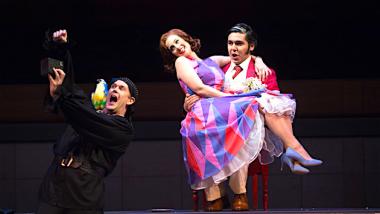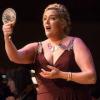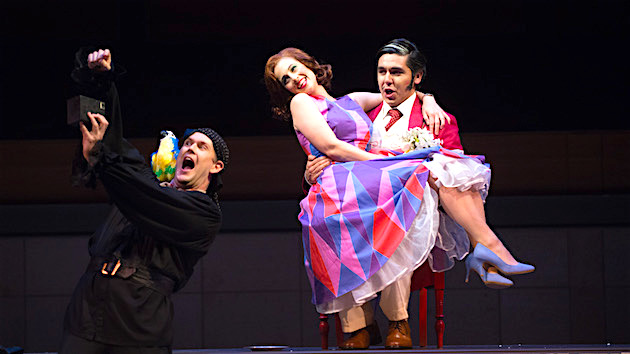
The Merola Opera Program covered about as much artistic ground as even the most ambitious company could in a single evening on July 20 and 22 at the San Francisco Conservatory of Music. In showcasing the sterling talent of the San Francisco Opera’s summer training program, Pergolesi’s La Serva padrona and William Walton’s The Bear formed two distinctly different comic short opera bookends around Gustav Holst’s Sāvitri, a stately and declamatory work based on the Sanskrit epic tale the Mahabharata.
The evening opened with a chatteringly busy introduction to the roots of Italian opera buffa, switched gears dramatically to a somber meditation on the ravages of war, and concluded with an ebullient adaptation of a Chekhov short story that played like the musical version of a Russian graphic novel.
Bracing as all that variety of musical history was, the sheer firepower and finesse of the singing carried the night. Fittingly, in the program’s 60th-anniversary year, the 2017 Merolini gave this operatic triptych its color and sheen. Whether it was the zinging, trilled “r’s” of soprano Jana McIntrye as a saucy and domineering maid in La Serva, the bedrock-deep intonations of bass-baritone David Weigel as the voice of Death in Sāvitri, or the hostility-sparked romance of mezzo-soprano Ashley Dixon and bass-baritone Cody Quattlebaum, the high standards and practices of Merola were evident throughout.
The peak of the evening came in Holst’s dramatic centerpiece. Premiered in 1916, five months after the deadly Battle of the Somme, Sāvitri was at once timeless and time-dated. Director Peter Kazaras made that point explicitly in a program note and preshow supertitle message, underscored by Kristi Johnson’s World War I-era costumes and the bone-white lighting of Chris Lundahl.
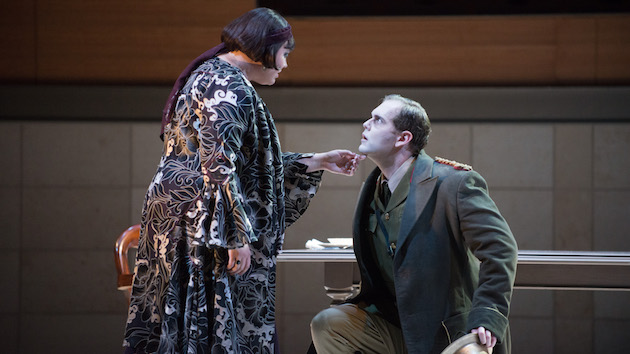
Singing from the back of the Conservatory’s theater, Weigel gave Death’s long phrases an ominous, sustained authority. Soprano Kelsea Webb, who started out with a slightly occluded tone but bloomed majestically later on, was his vividly attentive listener in the title role. Tenor Addison Marlor brought a wonderfully warm and engaging voice and presence to the role of Sāvitri’s apparently war-addled husband, Satyavān.
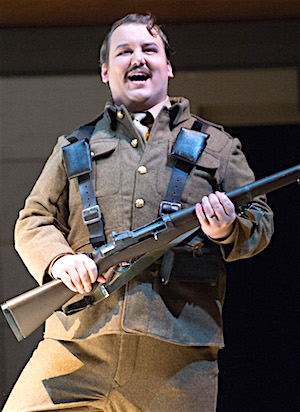
Conductor Christopher Ocasek and his orchestra, who performed with distinction throughout the long evening, supplied Holst’s spare touches in the early portion of the piece, a good deal of it sung a cappella. As the composer’s own libretto moved into deeper (and sometimes ponderous) exchanges about life, death, and existential meaning, the singing grew more urgent and the orchestral texture thickened.
At once intense and theatrically static — Satyavān sat immobilized in a chair for a long stretch — Sāvitri made its impact almost entirely and effectively in the slow accretion and release of musical tension. The singers brought a full-on sense of conviction to the piece. “I ask for life,” sang Webb in one blunt confrontation with Death. Minutes later, even as he was retreating, Weigel found a weighty solemnity in Death’s exit.
Of the two comic one-act pieces, The Bear proved to be the more fully satisfying diversion. Adroitly staged on a unit pedestal set decorated with a dollhouse, rocking horse, and assorted other toys, Kazaras’s production gave the reluctant lovers Popova (Dixon as a weepy widow) and Smirnov (Quattlebaum as her fuming, red-bearded creditor) plenty of room to play with and play up their parts. Bass baritone Daniel Noyola chipped in with a lively and deftly sung turn as a harried servant.
If Dixon didn’t exploit all the comic potential of the music, her acting was first rate, whether she was collapsing in a heap of misery or going into a panic of indecision about her feelings for the new man in the house. Quattlebaum used his growly low tones and occasionally falsetto eruptions to relish the libretto’s rhyming couplets and the score’s illustrative qualities — string swoons and woodwind squawks and clip-clopping woodblocks. If some of that sound-painting became a bit heavy handed and overly literal at times, the cast’s lighthearted touch worked right up to the cheerfully bawdy ending of this Chekhovian cartoon.
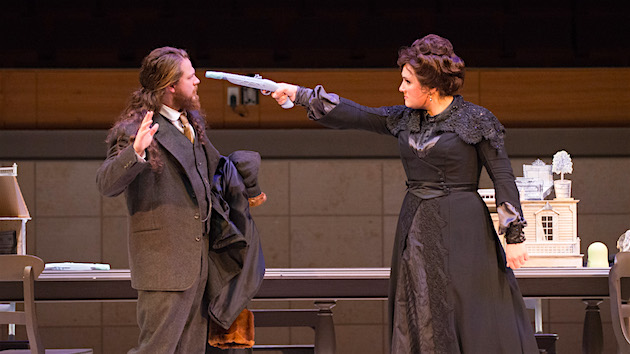
Noyola, as the vexed bachelor Uberto to McIntyre’s scheming marriage-minded maid Serpina, was all aquiver with impatience at the outset of La serva padrona. His hot chocolate was three hours late. It wasn’t long until he was in much deeper romantic waters with Serpina.
Pergolesi’s duet (with a nonspeaking role played by Weigel here) is a seminal work in operatic history. You can feel the master-servant conventions that Mozart, Rossini, and many others would mine for operatic gold soon enough. Here, in some speedy if lengthy da capo arias and one sweetly lyrical interlude, it’s all taking shape.
While both principals sang with virtuosic command — Noyola’s firmly grounded lines and McIntyre’s fluting, briskly bird-like timbres were both admirable — a near frantic level of stage business felt like overselling the goods. McIntyre’s flirtations with her boss came off as something closer to bald-faced seductions, and his agitation bordered on a nervous disorder.
But the voices, as they did all night, took over and took control. The triple bill began as it ended — with an unlikely and happy romantic climax.

